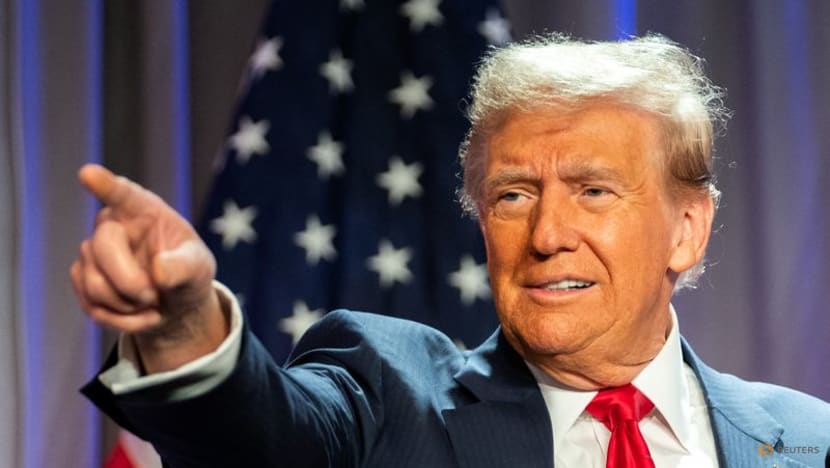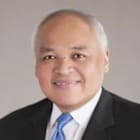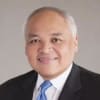Commentary: Trump could be the most powerful US president
The most powerful US president since FDR will demand a different approach, say Steven R Okun and Thurgood Marshall Jr.


This audio is generated by an AI tool.
SINGAPORE: In just three days, Donald Trump will be sworn in as the 47th president of the United States, marking the start of his second term and ushering in a new era of presidential power.
The US Constitution’s system of checks and balances was designed to prevent an imperial executive, distributing authority among the president, the Congress and the courts. Yet, Trump re-enters the White House poised as one of the most powerful non-wartime presidents in US history, dominating Washington and international affairs.
Governments and businesses will need to navigate Trump’s ways, given he will push an even more aggressive agenda than he did in his first term, one in which he achieved significant accomplishments on immigration, taxes and China, among others.
He will accomplish this through a combination of aggressive use of powers, such as his promise to declare a national emergency to carry out mass deportations, appointing loyalists throughout the government and leveraging his influence within a party that holds controlling majorities in both chambers of the US Congress.
The US media will not hold Trump to account as it has in the past, witness varying instances in which the Washington Post, LA Times and ABC defer to Trump.
The US business community now finds itself adapting to Trump’s influence. Sure, that happens when it comes to preparing for every new occupant of the White House, such as by hiring that person’s loyalists or donating to their inaugural committee.
But with such a transactional president, business takes this to new levels. Meta, Google, Apple, Microsoft and Amazon have each given US$1 million to the inauguration, and boards and CEOs are likely to provide more money for his presidential library and foundation.
American companies are also dropping employment policies anathema to his Make America Great Again movement, scaling back on diversity, equity and inclusion programmes and scrapping fact-checking content on their platforms.
Their reward: Elon Musk, Jeff Bezos and Mark Zuckerberg will not only attend the inauguration, but they reportedly will have the unprecedented honour of sitting with Trump’s Cabinet nominees.
Governments and businesses in the region must find ways in their own context to emulate the tech titans.
TRUMP SEIZES EVEN GREATER POWER
American presidential power has evolved over time from the delicate balance among the three branches established by the founding fathers to a more powerful executive branch that nevertheless still operates within a system of checks and balances.
Those guardrails against a president usurping power beyond the Constitution continue to exist in the hands of the legislature and the judiciary. However, the power of the modern American president has been enhanced to meet challenges including war. Prime examples include expansions of authority granted or exercised by Abraham Lincoln during the Civil War and by Franklin D Roosevelt during World War II.
Even before then, Roosevelt amassed considerable authority to promote the New Deal initiative and related programmes to lead the US out of the Great Depression. FDR reorganised the White House and the executive branch for that purpose, creating the executive office of the president in 1939, growing resources and staffing substantially to implement his all-encompassing agenda.
Subsequent presidents have taken full advantage of that. George W Bush exercised expanded authority in response to the Sep 11 terrorist attacks. Barack Obama continued that trend through executive action in pursuing his agenda without Congress.
Trump has access to all the power amassed by his predecessors, and he built on that the first time around by testing those limits. This term, he will blow through existing norms to amass even great power.
“Trump is good at talking but has been less successful governing,” Mike McCurry, White House press secretary under president Clinton told us.
“Six months from now he may be exasperated that he can’t snap his fingers and make things happen. Our system is designed for careful deliberation, not knee-jerk decisions.”
Thus, the full-frontal assault on guardrails becomes more critical for Trump to be able to carry forth the MAGA agenda.
TRUMP WEAKENS GUARDRAILS AGAINST AN IMPERIAL PRESIDENCY
Guardrails are designed to direct away and protect from hazards. As Trump re-enters office, he continues to challenge existing guardrails.
A Congress controlled by Republicans, many of whom came to power with Trump’s support, seemingly will defer to him other than in the most egregious examples, such as his initial nomination of Matt Gaetz to be Attorney General.
Nominating a person found by congressional ethics investigators to have paid numerous women - including a 17-year-old girl - for sex, and to have purchased and used illegal drugs, including from his Capitol Hill office, turns out to be a bridge too far even for Trump to be able to cross.
It remains to be seen if any of the other nominees with clearly troubled backgrounds, notably Pete Hegseth for Defense, Tulsi Gabbard as Director of National Intelligence or Robert F Kennedy Jr for Health and Human Services gets confirmed. If any do, let alone all three, it will show Trump’s unrivalled presidential power in the post-war era.
The opposition party has failed as well.
As Democratic strategist Peter Goelz told us, “To have guardrails you must be willing to fight. Democrats want someone else to do the heavy lifting, such as Robert Mueller as the independent counsel in the first term or Liz Cheney on the Jan 6 committee - anyone but the Democrats themselves. Now, it’s too late to stop him.”
Last July, the Supreme Court eliminated a key check on Trump’s power. There, the Court ruled that presidents have “absolute” immunity for acts committed as president within their “core constitutional powers”, at least “presumptive immunity” for “acts within the outer perimeter” of their official responsibility, and no immunity for unofficial acts.
As such, Trump enters the presidency this time knowing he has free reign in his decision-making from basically any criminal liability when he leaves office - arguably including ordering actions with the intent to stay in power after his Constitutionally-limited second term.
However, the recent Supreme Court ruling against Trump in the New York hush money case did surprise, especially Trump-appointed Justice Amy Coney Barrett proving to be the deciding vote in a 5-4 decision. It’s possible the current Supreme Court just has not had the facts it needs to assert itself.
A bit of a hedge, and one on which no one should count.
ELIMINATING THE TRADE DEFICIT, CREATING JOBS, RISING STOCK PRICES
When a single person has so much authority, one must tailor their arguments to him.
Governments and businesses alike need to frame arguments for or against policy in terms of how that might impact the market. They need to show how they will contribute to Trump’s main priorities of lowering the trade imbalance and creating US jobs.
When Trump proclaims tariff “as the most beautiful word in the dictionary”, believe him. Trump has vowed to impose blanket tariffs of up to 20 per cent on imports from all countries, and a 60 per cent tariff on Chinese goods.
Governments, businesses and investors must focus on positions in which they can provide empirical evidence of how bringing foreign direct investment and jobs to the US can result through the nexus of economics and foreign policy.
Certain government officials get this.
Giving a not-so-subtle sign to his country’s industry, the day after Trump defeated Vice President Kamala Harris, South Korea Trade Minister Cheong In-kyo said: "If tariffs get raised, the first alternative firms can consider will be raising direct investment and on-site production."
ONE CHECK REMAINS - “THE MARKETS”
During his first term, before COVID-19 crushed the economy, Trump bragged about the gains in the US stock market as a sign of his success. Trump will again keep score of the Dow Jones Industrial Average, S&P 500 and NASDAQ, regardless of whether that shows the true health of the economy.
Governments and businesses need to present evidence of how policies will boost the economy, or conversely show that Trump’s agenda will hit the stock markets or increase inflation.
This requires a different way of thinking than government officials have undertaken in the past.
Economics and investments, not geopolitics and alliances, drive the returning president.
Protecting their national and economic interests requires it.
Welcome to Trump 2.0.
Steven R Okun and Thurgood Marshall Jr served in the Clinton administration as Deputy General Counsel at the Department of Transportation and White House Cabinet Secretary, respectively. Mr Okun serves as CEO of APAC Advisors in Singapore. Mr Marshall practices law in Washington.






















